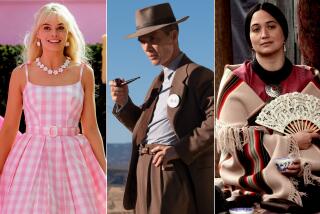Austen’s look back at what might have been
- Share via
As part of its “Complete Jane Austen” series, coming to you via the venerable “Masterpiece Theater” -- or “Masterpiece,” as it seems to be less called now -- PBS is airing “Miss Austen Regrets,” a BBC-sprung biopic with a title that references Cole Porter. The rest of it is more historically apt. And as these things go, it is excellent, due in no small part to a thoroughly imagined performance by Olivia Williams.
Because she wrote about her time and the places she knew, an Austen biopic can happily look just like an adaptation of one of her books. (This one, directed by Jeremy Lovering, designed by Melanie Allen and photographed by David Katznelson, looks very good.)
It allows for the same atmosphere and activities -- the country lanes, the walks, the visits, the empire waists, raging passion channeled into polite conversation -- and has as its center a woman with a sharp wit and a lively spirit. (Think Lizzie Bennett with a pinch of Elinor Dashwood, here on the verge of 40.)
The difference is that the author’s own life took another course from that of her heroines: She never married. And she wrote books.
This is the second recent movie about Austen, after last year’s theatrical release “Becoming Jane,” a thing of wild invention that packed her off on an aborted elopement to Scotland. Like that film, “Miss Austen Regrets” ruminates on the author’s love life, or lack thereof -- tries to rectify it, in a way, by painting her as a creature of inner passion. But while screenwriter Gwyneth Hughes (the excellent kidnapping miniseries “Five Days”) has drawn some serious curlicues around the few available facts -- and she has definitely done her homework -- she has also managed to create plausible characters and crises.
Like most biographical films, it lacks plot, but by focusing on just the last couple of years of her life, Hughes has time to open up individual scenes and investigate ideas and inner flames rather than merely staging a pageant of great moments.
To Austen’s usual concerns of the interplay of love and money, Hughes adds the question of art and whether it might be worth sacrificing the first two for the third. “You have something much more powerful and much more desirable than experience,” Jane is told by a young doctor for whom she conceives what would have been then considered, as now, an age-inappropriate liking. “You have imagination.” Later, a French maid says something of the same kind.
The Jane we see here is a little wilder, perhaps, than any of her creations, a little more dangerous for being grown up. (No one can say whether she’s wilder than the original.) But by various accounts and on the evidence of her own letters, Austen’s spinsterhood, to use an unpleasant word, was not the product of a retiring nature or a face only a mother could love. (Perhaps her “unusually quick sense of the ridiculous,” as one grand-nephew wrote, had something to do with it.)
Williams (“The Sixth Sense” and Jane Fairfax in the 1996 “Emma” that airs March 23 as part of the Austen season) gives us a person capable of writing those novels, of imagining all the good and bad within them. This is a complicated Jane, mischievous, loving, sad.
Austen’s letters to her niece Fanny Knight, who had written for romantic advice, constitute the narrative spine. Fanny is a bit of the character in “Northanger Abbey,” her imagination excited by novels, though in this case they’re Jane’s own. “My darling girl,” Austen tells her, “this is the real world -- the only way to get a man like Mr. Darcy is to make him up.”
Still, like many biographical films, and, for that matter, many full-fledged biographies, “Miss Austen Regrets” gets dramatic mileage from the suggestion that art is a kind of veiled autobiography. Hughes suggests an echo of “Persuasion” -- we see her at work on it -- in Jane’s early decision to renege on an accepted proposal in her youth. And she has gone to Austen’s own letters for some of her best lines (altered for speech, to be sure, and sometimes used shamelessly out of context).
A sampling: “Single women have a dreadful propensity for being poor; and the best recipe I know for happiness is a large income.” (Joins a line from a letter with an observation from “Mansfield Park.”)
“I believe I drunk too much wine last night; I know not else how to account for the shaking of my hand today,” which also prefigures the illness that killed her at age 41.
“I shall be as polite to them as their bad breath will allow.”
“Pictures of perfection make me sick and wicked.”
And so on. There are some things you just can’t improve.
--
--
‘Masterpiece: Miss Austen Regrets’
Where: KCET
When: 9 p.m. Sunday
Rating: TV-G (suitable for all ages)
More to Read
Only good movies
Get the Indie Focus newsletter, Mark Olsen's weekly guide to the world of cinema.
You may occasionally receive promotional content from the Los Angeles Times.










